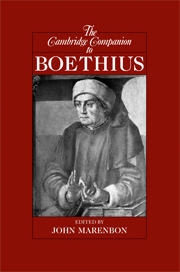Book contents
- Frontmatter
- Introduction: reading Boethius whole
- Part 1 Before the Consolation
- 1 Boethius’ life and the world of late antique philosophy
- 2 The Aristotelian commentator
- 3 The logical textbooks and their influence
- 4 Boethius on utterances, understanding and reality
- 5 The Opuscula sacra: Boethius and theology
- 6 The metaphysics of individuals in the Opuscula sacra
- 7 The medieval fortunes of the Opuscula sacra
- Part II The Consolation
- Appendix: Boethius’ works
- Bibliography
- Index: References to Boethius' works
- General Index
- Series list
1 - Boethius’ life and the world of late antique philosophy
from Part 1 - Before the Consolation
Published online by Cambridge University Press: 28 July 2009
- Frontmatter
- Introduction: reading Boethius whole
- Part 1 Before the Consolation
- 1 Boethius’ life and the world of late antique philosophy
- 2 The Aristotelian commentator
- 3 The logical textbooks and their influence
- 4 Boethius on utterances, understanding and reality
- 5 The Opuscula sacra: Boethius and theology
- 6 The metaphysics of individuals in the Opuscula sacra
- 7 The medieval fortunes of the Opuscula sacra
- Part II The Consolation
- Appendix: Boethius’ works
- Bibliography
- Index: References to Boethius' works
- General Index
- Series list
Summary
BOETHIUS, SYMMACHUS AND THEODERIC
The society into which Boethius was born in about 480 was, in some respects, most unstable. From being the centre of a great empire, during the fifth century Italy had turned into a free-standing unit, as one province after another became independent of the authority of the centre, and a passage of power to military men which made the office of emperor increasingly irrelevant culminated in 476 when a new commander of the army, Odovacer, deposed the last emperor of the West, Romulus Augustulus. The event has been immortalized in textbooks as a major turning point in history, and in the following century some writers in the parts of the old Empire that remained under Roman rule, centred now in Constantinople, saw Odovacer's usurpation of authority as amomentous development. Contemporaries, however, did not see it in this light. The landowning aristocracy and the Catholic Church, both of which had been becoming more important, carried on as before, and the last emperor was sent with a generous pension to live in peaceful retirement on a country estate, possibly the very villa in which the emperor Tiberius had died. For most Romans, the events of 476 marked little change. Indeed, the new regime seemed to go out of its way to present itself as traditionally Roman. Odovacer repaired the Colosseum, where the names of the senators of the period can still be seen scratched onto the seats which were reserved for them, and the senate of Rome regained a right it had lost nearly 200 years previously, that of issuing bronze coins; the scenes these coins depicted, such as Romulus and Remus being suckled by the she-wolf, were nothing if not traditional.
- Type
- Chapter
- Information
- The Cambridge Companion to Boethius , pp. 13 - 33Publisher: Cambridge University PressPrint publication year: 2009
- 1
- Cited by



